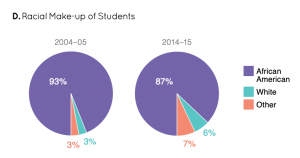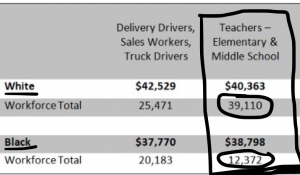The Issue: Hear the People
Charter schools in Orleans Parish confronted a new reformed educational system. Students returning post-Katrina were introduced to a different public school system orchestrated by the RSD, Recovery School District. RSD rescued post-Katrina failing schools. Minorities believed that the system failed them and silenced their voices regarding their education.

In 2006, minorities were most affected because 67% of the city population was African American, and 96.1% of African Americans attended public schools (Cook, 2018, p. 92). This intervention shrank the power of local school boards and decreased minority voices (Cook, 2018, p. 94). Minority families were politically and socially silenced during the reform. Further, the state was able to enforce regulations – for example, silence lunches and the “no excuses” policy (Mahnken, 2019) with no challenges. The resulting tensions later impacted teacher-parent relationships as the state hired teachers who didn’t reflect the needs of the most impacted communities (Mahnken, 2019).
The main impact of the reform was that black families developed a lack of trust for state officials who didn’t consider their best interests with implementing change. The nonprofit news site, “The 74,” presented an article and study by Jeffery W. Koch, which explained the distrust between the state and black new Orleanians. This study concluded that because of biased power structures and inequalities in New Orleans, “blacks are significantly less likely to place their faith in government officials who are white” (Mahnken, 2019). Koch’s study explained why communities most impacted by public education should have a role in the system ( Mahnken, 2019).

African American families, teachers, and leaders have taken action to fight back against the state. They created programs and organizations (Be NOLA and Our Voice) to ensure their children receive the tools and resources needed to avoid failure within the new system. Nuestra Voz protected the community’s best interests and became the vessel for parents to stay involved in their children’s education. At the same time, BE NOLA guaranteed black representation amongst the students and faculty.
